Home Prices are Rising Five Times Faster Than Wages - Australian Property Market Update for Week Ending 23 July 2017

Wages in Australia are currently growing about 2 percent per year. Home prices, on the other hand, went up about 10 percent over the past year, and that’s not even in the priciest areas. If you live in Melbourne, home price growth was about 8 times greater than growth in wages. And that's been happening for about five years straight.
Here's a chart I created showing growth in wages and growth in home prices in Sydney and Melbourne:
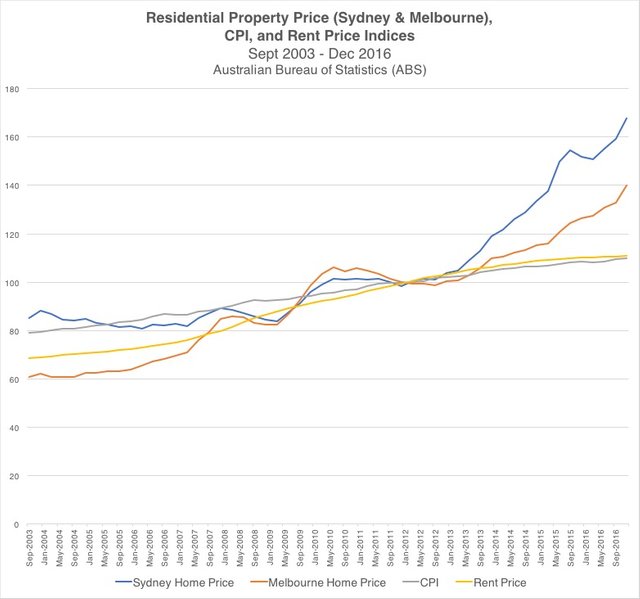
How much longer do you think that can continue?
More on that later. Here’s an update on some of the latest Aussie property market stats:
The Latest Preliminary Auction Activity
There appears to have been more buyers in the market this week, as both the number of auctions and the preliminary clearance rate increased at the same time in our capital cities. As has been the case lately, Melbourne buyers did most to lift the nationwide weighted average. Both Sydney and Perth also had solid results this week above 70 percent. Canberra was the only other capital to post a preliminary clearance rate in the 70s, with Adelaide narrowly missing the mark.It’s important to note, both Sydney and Melbourne’s final clearance rate will likely go lower after all the auction results are counted later this week. I wouldn’t be surprised to see Sydney at or below 70 percent. Melbourne will likely post a result somewhere in the higher mid-70s.
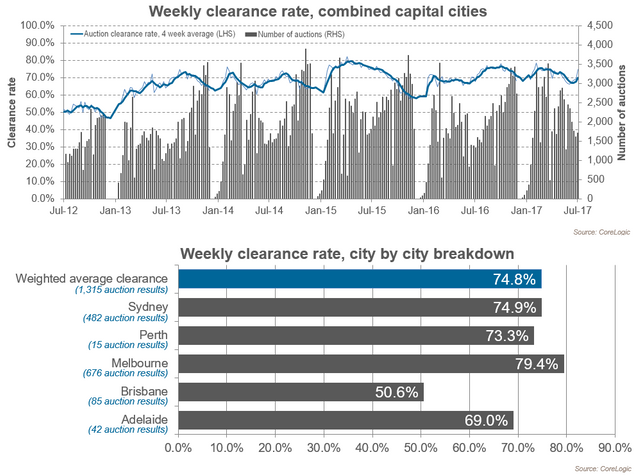
source
Expect auction volume to rise again next week as all the capital cities are scheduled to host more auctions than this week. This increase in supply will test the resolve of both buyers and sellers. Buyers will have more to choose from, which should lead to greater competition amongst sellers.
Last Week’s Final Auction Results
With buyers in Sydney having a little harder time coughing up cash for deposits, the New South Wales capital hasn’t seen a clearance rate above 70 percent for six weeks. Melbourne buyers, on the other hand, are a little more resilient. There the clearance rate has remained above 70 percent since this time last year.
Here are all the final capital city results for last week:
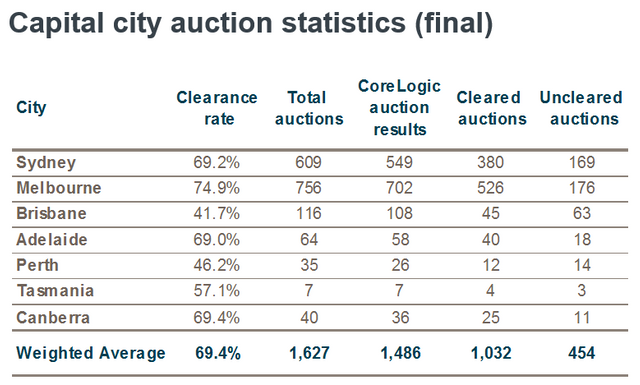
source
It was in the North West and Eastern suburbs of Sydney where demand was the strongest last week. In Melbourne, the suburbs taking out the top spots were the North East, Outer East and South East. The award for the best performing regional area goes to Wollongong, just south of Sydney.

source
Recent Changes in House Prices
As I reported last week, home prices in Sydney and Melbourne had been rising rapidly over the previous five weeks. This week, however, marked a shift in that trend. The median house price held steady over the past week, indicating that this recent mini-boom in prices could very well be coming to an end.

source
Looking back over the past three months, Sydney and Melbourne home values shot up 2 percent and 4 percent respectively. Brisbane and Adelaide are now both in the red for the quarter, while Perth remains the only capital city to still be in negative territory looking back at the last year.
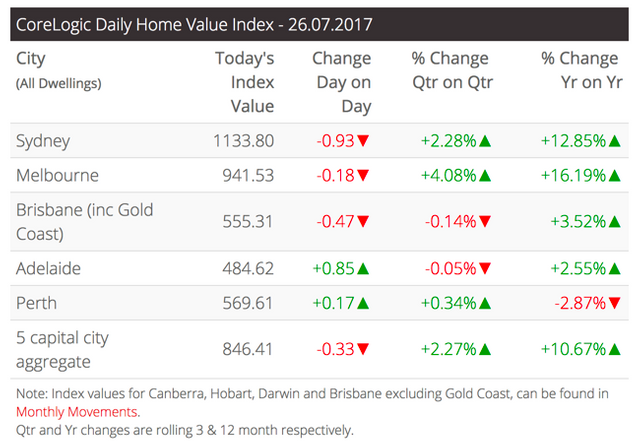
source
Market Analysis
The rising clearance rates and steady price action this week could be due in part to vendors willing to take less for their properties. With supply increasing as auction volumes are starting to rise again, agents are likely conditioning their clients down on price. After all, they care more about getting the house sold and pocketing a commission than bleeding buyers for more money.
As I look at the bigger picture and what has been impacting the movement of house prices the most lately, auction volume, which is a function of supply, stands out. As you probably learned in economics class, when supply falls, prices tend to rise, all else being equal. Conversely, when supply increases, prices tend to fall as buyers have more choice and sellers lower their standard.
While home prices seem to have leveled off this week, next week will bring another surge in supply. It will be interesting to see if prices fall a little further as a result.
The Bigger Picture for Home Prices
There will be many investors who continue to see the trend as their friend. They will find reasons to expect house prices in our largest capital cities to keep going up, up, up. After all, why resist the trend? Melbourne home prices have increased 16 percent over the past year and Sydney is up almost 13 percent.
I’ll be the first to admit, with growth at that level after the crazy price increases of the last five years, it's not likely that the property market will come to a grinding halt; that is as long as nothing crazy happens in the debt markets.
Unless the RBA shocks us all and lifts interest rates or bond prices collapse in the US and EU, it will likely remain business as usual in the housing market here. We could see an ongoing moderate amount of growth in the first half of 2018, and home prices flattening out in the second half of next year or in 2019.
But there will be those who find reason to stay out of the market all-together. Afterall, home prices have been increasing five times faster than wages across the country for the last five years, with an even greater disparity looking at Sydney and Melbourne. Any reasonable person would agree that eventually that has to stop. Eventually demand will fall, supply will rise, and home prices will correct.
Alternatively, wages could increase while home prices remain flat. That’s what our government and regulators really want. But that would mean inflation across the board, and life won’t be getting any better if the price of groceries, fuel, utilities, and everything else start rising as well.
As economist from the Swiss bank UBS came out with a dire warning for Aussie this past week. He warned that our property market has now peaked and that any interest rate hikes from central bankers would trigger the mother of all property crashes, in Sydney and Melbourne especially.
He did, however, agree with me that there is a greater chance of hell freezing over than the RBA raising interest rates. “Looking ahead,” he said, “we still see price growth slowing to 7 percent year-on-year in 2017 and 0 to 3 percent in 2018, amid record supply and poor affordability.”
What virtually everyone here in Australia seems to be unaware of his how dependent home prices are on the overseas debt markets. Sure, the RBA ain’t raising rates anytime soon. But soon enough the bond bubble created by artificially low interest rates will burst and yields will spike. That will mean Aussie banks have to pay a whole lot more for the capital they lend out to homebuyers. When that happens, interest rates will rise and I will feel very sorry for all a lot of people.
Until then, eat, drink, and be merry.








Jason Staggers

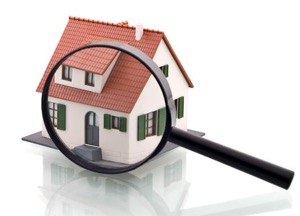

Hello @jasonstaggers, Reading your post I can not imagine how the economic problem of Australia or another country. Of course my point of comparison is the information that you have provided through your POST. I would not know how to explain the problems of Venezuela. I can only give an example. I started building a house in 2014, I invested 4400 $ (US Dollar) equivalent to 44000Bs (Venezuela) and my salary was [12000Bs = (1200 $ US dollar)], I could not continue to build my house because of excessive inflation. In 2017 4400 $ (US Dollar) is equivalent to 39600000Bs (Venezuela) and my monthly salary is [383000Bs = (42.55 $ US dollar)]. That's why I read 10% increase in cost there. And I can not understand the impact on the economy. Unbelievable as in 3 years I lost purchasing power. If this continues, I will never finish my house. This leads me to see the problems of other countries as simple to solve. Thank you for sharing your information.
Google Traslate. ;)
Thank you for sharing your personal experience with the horrible economic problems in your country today. I can't imagine how frustrating it must be to be in that situation, and it does make Australia's economic challenges look like a walk in the park. I appreciate you giving some perspective.
What stands out to me from your situation is that even though your wage has increased in terms of Bs, it has fallen in terms of buying power. Our central bankers here are trying to increase inflation with the hope that it will also increase wages. But the lesson of Venezuela and every other country that has experienced mass or hyper-inflation is that wages do not automatically increase when consumer prices increase.
Unfortunately, I'm concerned that with the excessive suppression of interest rates and money printing by central bankers, eventually, we may also experience something similar to Venezuela. Whether it's deflation or inflation, our own time of reckoning will come.
Thanks again for your excellent comment. I hope Google can properly translate this for you :)
My dear friend, I hope you never get to experience something like what is happening in my country. Where something so necessary, like eating. It becomes almost impossible. I really do see people fighting for 1 kilo of rice. It is something that sad and that before only saw it in apocaliptiac films. Thanks and regards. ;)
Are you on steemit.chat? I was going to send you a direct message. I have a question for you.
Ready. :)
Great post Jason, have you notice the surge in the Australian dollar lately, if this continues it's going to have a huge effect on the Aussie economy. This could force the RBA to drop interest rates to try to halt the rise in the A$, zero interest rates here we come!!!
Indeed, great point. I think the RBA has always seen lower rates as an inevitability. The strong dollar provides just the excuse they need to go ahead and do it. Otherwise they would cop it for throwing more fuel on the property market fire. I'd also expect APRA to tighten up further on investors.
You could compound that with a continuing slump in commodity prices as the world teeters on the brink of a recession. That will definitely put cap on wage growth as well.
Yep, the RBA faces a tough task in boosting wages. I do expect them to try, however, which makes things interesting as it could lead to excessive inflation. That said, I suspect the USA will destroy their currency first, and then the RBA will have to break ties with the dollar to avoid the same. As they let the Aussie appreciate (relative to the USD) deflation would follow.
Time will tell.
Excellent Report Jason. Something in these market bubbles must give soon. Resteem for the benefit of the entire Steemit Community.

Seems like the only place they are dropping is up here in broome...
All of WA has taken a beating lately. At least it's still paradise up there.
True. that is whats keeping us up here
@jasonstaggers, I'm in Adelaide and aside from house prices increasing, let's not forget the utilities prices. Electricity is through the roof. Thankfully my wife and I earn semi decent wages, however it still hurts the pocket. Thanks for the post! very informative.
Yeah, I know what you mean. My electricity bill just showed up this week and I was shocked.